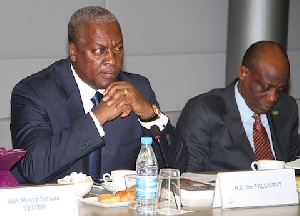The National Budget for the 2014 fiscal year would be read in Parliament today but already Ghanaians in the various sectors are upbeat about their needs being met judiciously this time around. The budget comes in the wake of public sector wages taking over 70 per cent of total revenue.
Economic Sector
Economists have cautioned the government to use the 2014 Budget Statement and Economic Policy to tackle the overrun budget deficit proposing far reaching policies to stabilize the economy.
The wage bill for next year, the management of subsidies and interest payments on government debts and instruments were highlighted for critical assessment. Executive Director of the Center for Policy Analysis (CEPA), Dr. Joseph Abbey, said the 2014 budget should adopt measures to address government’s rising expenditure as well as wage bill.
Dr. Abbey, also an economist and statistician said the fiscal deficit at the end of this year would greatly feed into the development agenda for next year.
He had doubts if the fiscal deficit of nine per cent would be achieved by the end of the year adding that if it does not happen the market would react sharply and this would have serious effect on the economy as borrowing cost would begin to rise sharply.
Health Sector
Long before the drafting of the proposed budget for review, government was advised by the Universal Access to Healthcare Coalition, a network of NGOs, to raise additional financing for health through other innovative mechanisms and progressive taxation rather than through costly and inequitable premiums.
They made the proposal in relation to the ailing NHIS in a report which spites the fact that the majority of NHIS income comes from the VAT levy which everyone pays making it simply unfair for a significant portion of the population to remain excluded because they cannot afford to pay twice.
Meanwhile the Chief Executive Officer of the NHIA, Sylvester Mensah confirmed the challenge during the Authority’s 10 years anniversary proposing for levies on tobacco and alcoholic beverages to be directed at the scheme. He called for an increase of the NHIA levy, road fund levy and 20 percent of communication service tax assigned to health insurance. He didn’t leave out the petro-chemical industry where he believes would be prudent to accrue some levies.
Social Sector
Dr Steve Manteaw, Campaign Co-ordinator of the Integrated Social Development Centre (ISODEC), has urged government to seal the loopholes in the Petroleum Income Tax Law which cost government US$70 million in the non-payment of Capital Gains Tax.
Dr Manteaw also called on government to eliminate corruption in procurement practices and raise taxes on alcohol which would increase government’s revenue base to meet demands for increased budgetary expenditure allocations to essential services delivery agencies.
This he believes would efficiently deliver on their mandate of promoting and enforcing economic, social and cultural rights, and advancing the cause of the vulnerable in society, particularly women, children and the disabled.
Emphasizing on Dr. Manteaw’s point, Mrs. Philomena Johnson, Coordinator of the Institute for Fiscal Policy (IPF) called on government to improve budget expenditure allocations to sub-sectors of Social Sector Ministries to reduce their numerous challenges.
She pointed out to essential services sectors namely; Education, Health, Water and Sanitation, Gender, Children and Social Protection, including poverty reduction interventions sub-sectors which are highly under resourced leading to their poor performances according to a research conducted by IPF this year.
Mrs. Johnson called on the Parliamentary Committee for these five sectors and the Finance Standing Committee of Parliament to request the Ministry of Finance and the cited Social Sector Ministries to review the approach used in budgeted expenditure Allocations, first to the Sectors from the Total Ministries Department and Agency (MDA) budgeted allocations and secondly from the Sectors’ Budgeted expenditures to their key sub-sectors during the 2014 Budget discussions.
Government Response
After a cabinet meeting to review the national budget proposals for presentation to Parliament, Mr. Mahama Ayariga, the Minister of Information and Media Relations said the budget would, among other things, cater for job creation, skills development and the maximization of efficiency in the economy.
He hinted that the budget would also include the transition of the Ghanaian economy from lower middle income to the middle income level, attributing the over running of last year’s budget to payment of salaries and wages.
“Coming out with the budget before negotiating for salaries and wages was not helping and that is why President John Dramani Mahama earlier this year called for salary negotiations before reading of the budget”, he added.
He also blamed the situation on domestic borrowing which resulted in higher interest rates, giving the assurance that government would subsequently go in for international loans which attracted comparatively lower interest rates.
He noted that because Ghana had attained a lower middle-income status, it was no longer getting grants to finance therefore government was now strengthening its efforts towards executing projects through public-private partnership (PPP).
Mr. Mahama Ayariga said the 2014 budget would shift from Activity Based Budgeting (ABB) to a Programme Based Budgeting (PBB), which would require spending to be tied to the delivery of specific projects.
Parliament
A call by the Minority of parliament for the postponement of the presentation of the 2014 Budget was refused by the Speaker of Parliament, Edward Doe Adjaho. The proposal was made by the Member of Parliament for Atwima Mponua and also the Minority Spokesperson on Youth and Sports, Isaac Asiamah on the floor of Parliament to enable the nation concentrate on the return leg of the Black Stars' World Cup qualifier against Egypt which would be played on the same Tuesday.
The Speaker however indicated that rescheduling the budget reading would not be needed as it will not have any impact on the game.
He explained that the game would be played at 4pm by which Parliament would have been adjourned.
What do you expect?
General News of Tuesday, 19 November 2013
Source: www.ghanaweb.com













